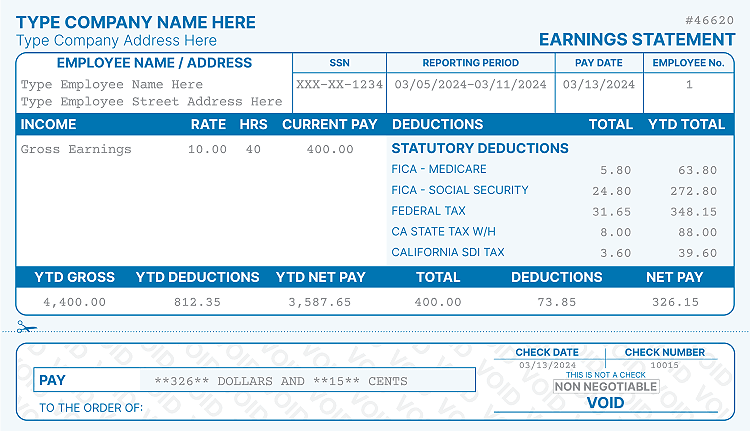8 Best Practices for Payroll Management
Payroll management is a critical function that takes care of the payment of salaries or wages. It includes accurately calculating earnings, deducting taxes and other contributions, managing regulatory compliance, and ensuring payments are made on time and without error.
Payroll management can be complex, tedious, and overwhelming without the right guidance. However, failure to correctly manage payroll not only leads to compliance issues and potential legal problems but unsatisfied employees as well. So, this article will discuss some top practices for ensuring your payroll processes are accurate and efficient.
Payroll Management Best Practices
1. Keep Accurate Records
Maintaining accurate records involves keeping employee information up to date, as well as the hours they work during each period (if they’re not salaried) and their payroll transactions. Keeping these records ensures workers are paid correctly and that you remain compliant with regulations.
To be sure that your records are kept accurately, establish a clear policy for payroll management and train all relevant employees on these policies. Make sure you use reliable methods for retaining records such as backup up all data electronically (while ensuring it is secure).
To make this easier, you may use specialized payroll software that will automatically generate reports, keep track of your payroll expenses, and perform calculations for you. For example, our pay stub generator makes it easy to provide proof of income for your employees – and their pay check stubs can be downloaded or emailed instantly.
By implementing the steps above, your business can avoid common errors and decrease the risk of fraud and data breaches, while ensuring that your payroll information is easy to access and updated accordingly.
2. Use Payroll Software
Again, payroll software can be especially helpful when you need to maintain accurate records. These programs are also designed to automate various aspects of payroll management for you, saving you a lot of time.
Most payroll software programs will help you track employee hours and benefits, calculate taxes, and generate paychecks. Additionally, they can provide real-time access to data, allowing you to monitor payroll expenses and make timely, informed decisions regarding your company’s financial state.
All in all, this type of software saves time, improves efficiency, and decreases human error.
3. Stay Compliant with Regulations
Compliance is an important aspect of payroll management; failure to comply will lead to serious legal and financial consequences for your business and potential reputation damage.
The regulations your business needs to comply with include both federal and state laws related to minimum wages, tax withholding, overtime pay, and record keeping. There are also regulations related to employee benefits such as retirement plans and health insurance.
To ensure you remain compliant with all regulations, stay updated on all payroll laws and seek guidance or legal counsel as needed (and, as mentioned, keep accurate records). Also, note that some payroll software will help to automate compliance-related tasks such as tax calculations and reporting.
4. Make Accurate Payments On-Time
Making payments to your employees – on time – is a fundamental aspect of effective payroll management. When you make late or incorrect payments, it can cause financial hardship for your workers and will damage morale. It could even lead to legal consequences for your business that you definitely want to avoid.
To make sure your payments are timely, you will need to establish clear payroll processing procedures, make sure all your employee information is updated to date and accurate, and utilize electronic payment methods such as a direct deposit. These methods can help to reduce the risk of errors and give employees quick access to their funds. Another useful tactic would be to implement checks and balances into your payroll processing procedures to help minimize the risk of delays or errors.
Again, for hourly workers, you need to make sure you have an accurate method of tracking time and attendance.
5. Keep Confidential Information Secure
Maintaining the confidentiality and security of your company’s payroll information is critical. Payroll information contains highly sensitive data such as social security numbers, salary details, and tax information. If you fail to keep these details protected, it could lead to data breaches, identity theft, serious damage to your brand’s reputation, and hefty fines.
To keep confidential information secure, limit access to authorized personnel only. You should also implement password policies and two-factor authorization on all files that contain these details.
Make sure that all payroll records are kept in a secure location and provide regular training to all employees who have access to payroll management files on how to handle confidential details as well as the importance of data privacy.
Using secure software and encryption can also be very helpful in maintaining confidentiality. For some such a program, be sure to update it regularly to protect against any vulnerabilities.
Additionally, you should have a disaster recovery plan in place in the event of a data breach. This includes having procedures mapped out for notifying any affected employees, notifying the relevant authorities where required, as well as taking steps to prevent future breaches from occurring.
6. Ensure Good Communication and Transparency
Transparency is an essential part of effective payroll management. In this context, it refers to clarity and openness regarding how payroll information is communicated to employees. Ensuring transparency in payroll management can help build trust between employees and their employers, reduces the risk of disputes, and helps improve employee satisfaction overall.
Businesses should prioritize communication with their employees regarding their payments. This can include providing workers with clear details about their pay rates, benefits, and deductions, and quickly addressing any questions or concerns they may have. Businesses should also ensure that their employees are given accurate and easy to understand pay stubs or statements.
Other ways to improve transparency include providing employees with access to their payroll information through a secure online portal and ensuring that employees are aware of any changes to their pay or benefits in advance.
7. Conduct Regular Process Audits
It's crucial to perform audits on your processes at least once a year, regardless of whether you're using a simple manual timecard system or a sophisticated computerized program.
Automated systems can still make errors, and if these go unnoticed for too long, they can result in significant financial losses for your business and employees. For example, a small math error could lead to an employee being overpaid, or an incorrect tax classification for a new employee could result in inaccurate deductions.
Make sure to carefully review all paperwork and procedures to ensure that everything is running as intended. Additionally, if you're using any add-ons or plugins with your payroll software, ensure that all integrations are functioning correctly and that you're using the most up-to-date versions.
8. Watch Out for Time Fraud
Time fraud occurs when employees deliberately misreport their hours, take excessively long breaks, spend work hours on non-work-related activities, or engage in "buddy punching," where someone else clocks them in when they're not actually present.
To prevent this type of activity, consider implementing a check-in system that automatically records employee hours when they sign in or swipe a timecard. This can help deter fraudulent activity by utilizing biometric sign-in options such as fingerprint scanners.
In Closing
Effective payroll management is essential for the success of your business. By implementing the practices mentioned in this article, you can guarantee that your payroll processes will remain accurate, efficient, and secure.
To summarize, the practices were: accurate record keeping, compliance with regulations, making timely and accurate payments, keeping confidential information secure, ensuring good communication and transparency, conducting regular process audits, and preventing time fraud.
To help you remain organized, maintain accurate records, and make timely payments, consider using our pay stub generator. We offer customizable templates that you can download to help make payday go smoothly no matter what type of business you operate. Click here for more information.
Kristen Larson is a payroll specialist with over 10 years of experience in the field. She received her Bachelor's degree in Business Administration from the University of Minnesota. Kristen has dedicated her career to helping organizations effectively manage their payroll processes with Real Check Stubs.

